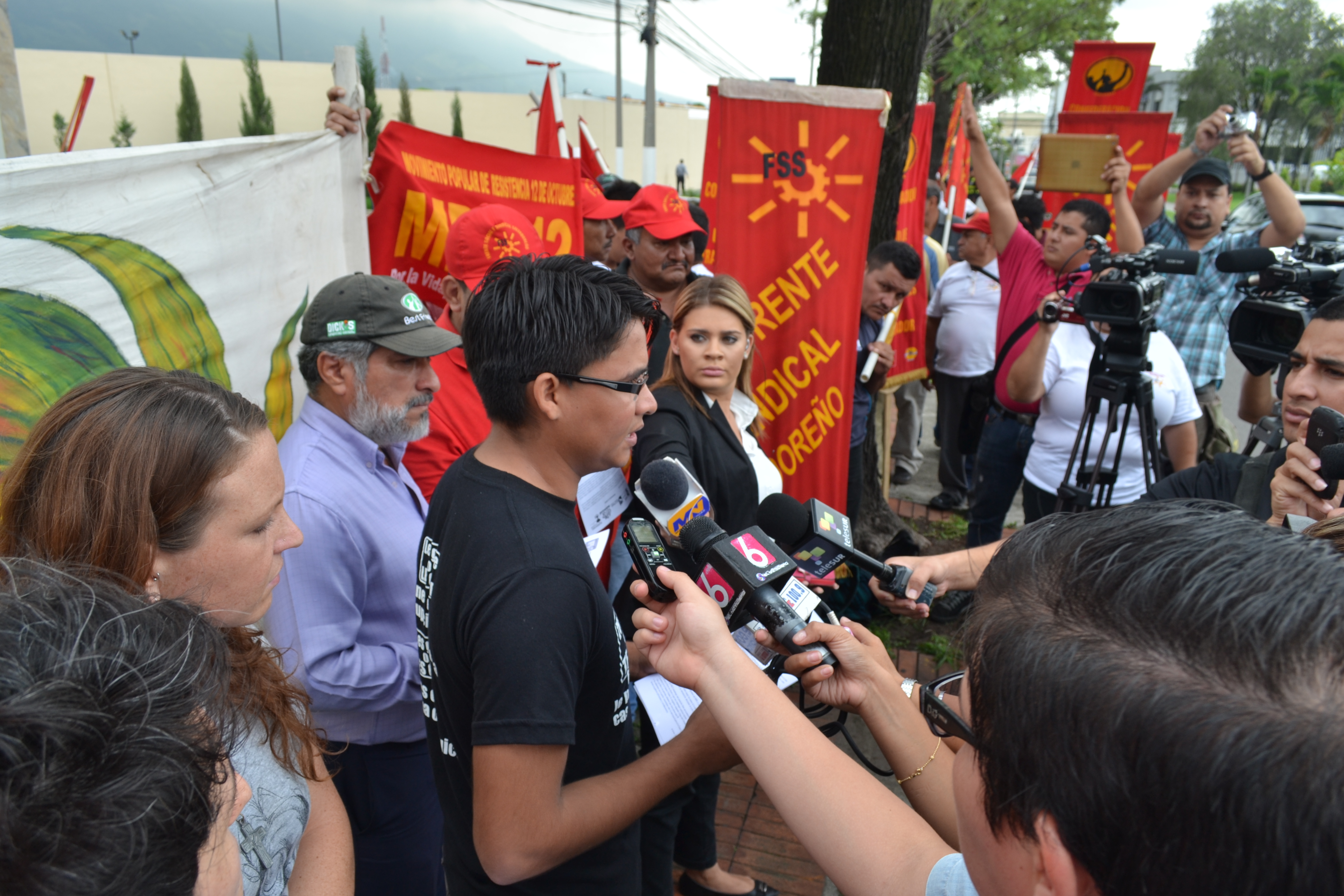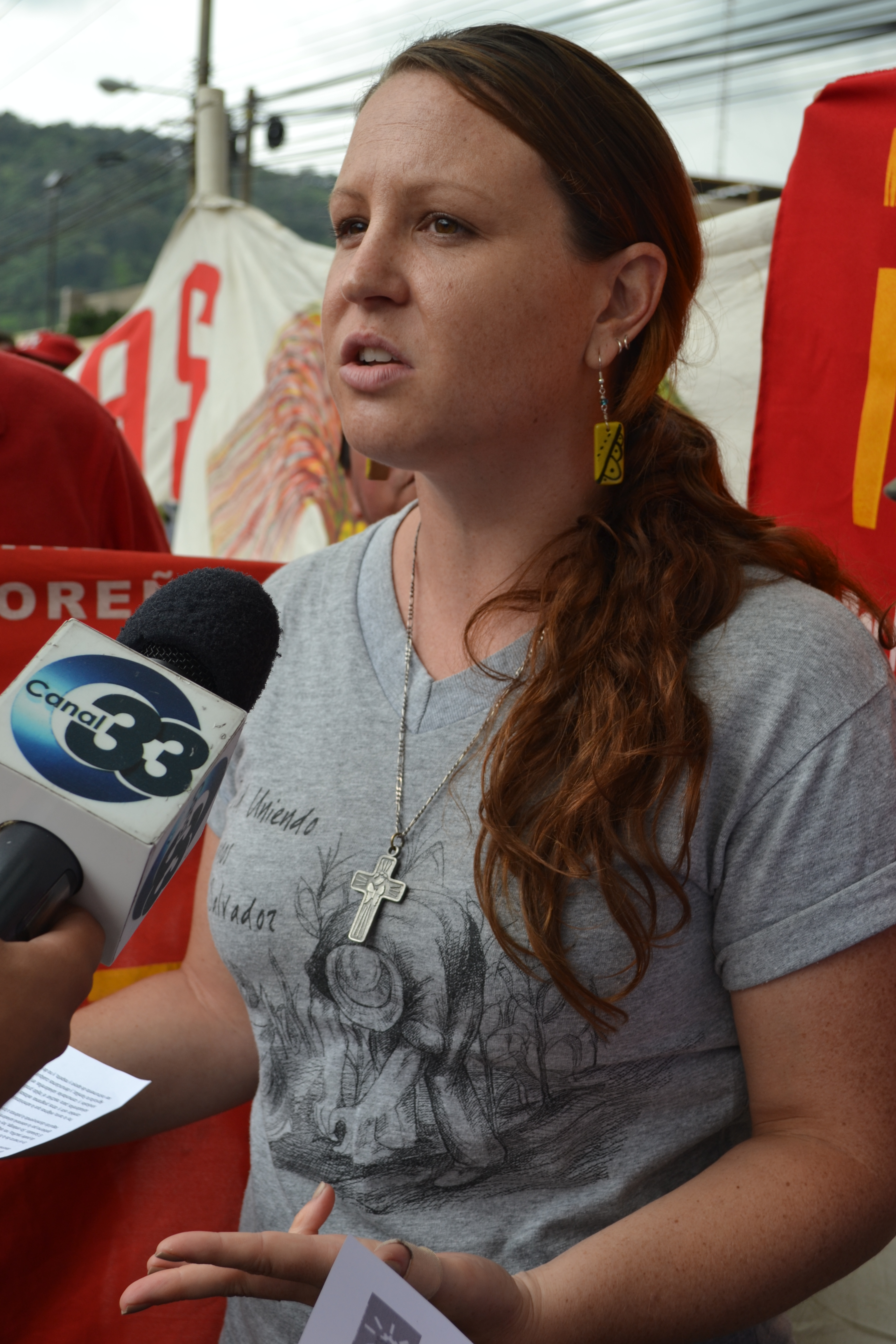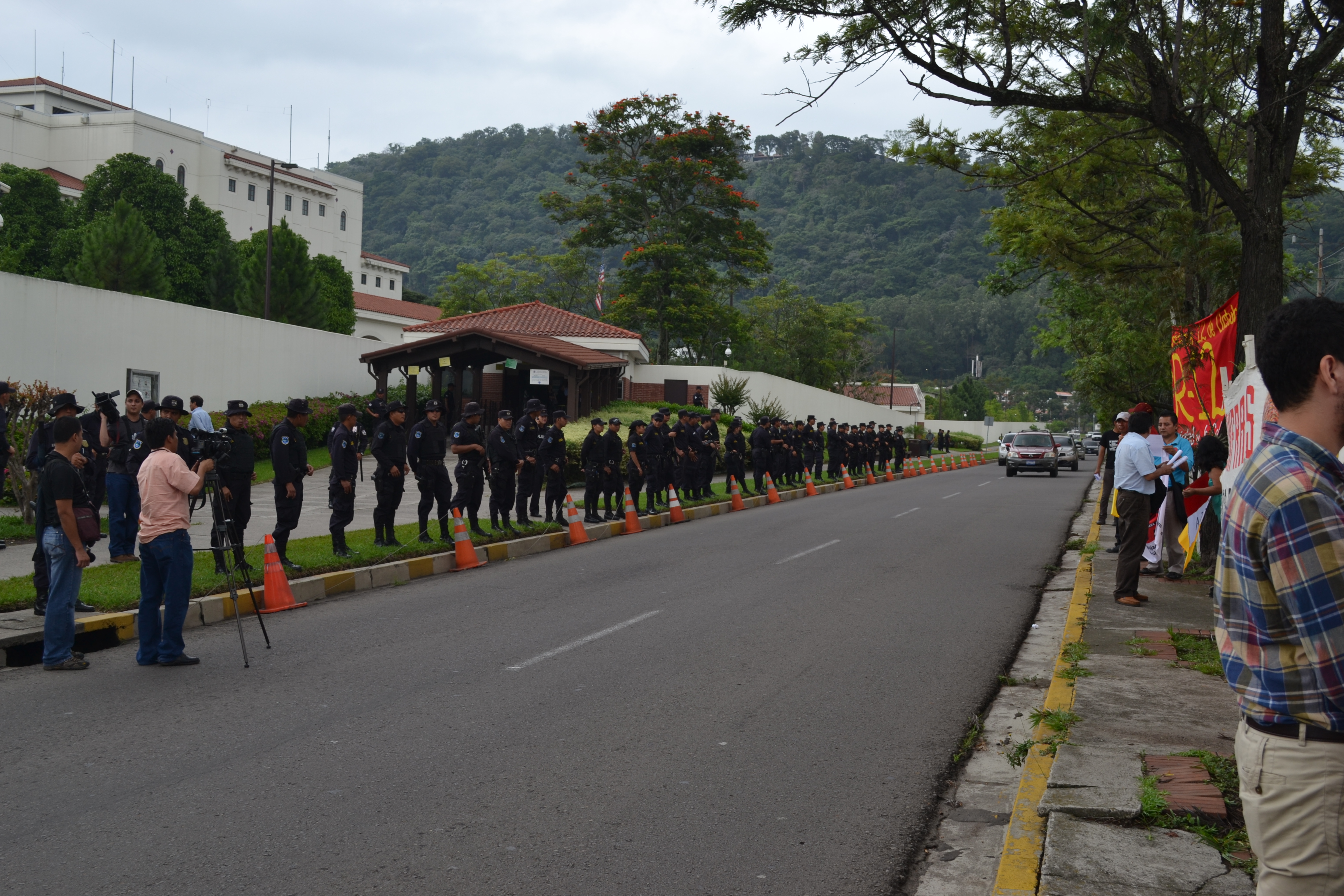By Kristi Van Nostran, Companionship Facilitator, RUMES, JH El Salvador

Juan Carlos from CRIPDES and other partners from Salvadoran labor unions and agricultural cooperatives came out in solidarity to add their voices to our call to the United States to stop pressuring El Salvador to purchase corn and bean seeds beyond its borders. Photos courtesy of Katy Strader.
The fireworks could be heard at daybreak, signaling the beginning of the Fiestas Agostinas in celebration of the Patron Saint of San Salvador, el Divino Salvador del Mundo, the Divine Savior of the World. Throughout the capital city, festivities will continue during the first week of August, yet while residents of San Salvador enjoy carnival rides and elephant ears, farming families throughout much of the rest of the country are concerned about significant crop loss due to drought conditions.
In what should be the height of the rainy season, El Salvador has experienced several days without rain, and the eastern region of the country, where an important percentage of the nation’s corn and beans are produced, hasn’t seen rain for nearly 25 consecutive days. There is already talk among Joining Hands partners in farming communities in the province of Usulután, east of the Lempa River, of the probable loss of 80% of this season’s harvest.
In response to the drought conditions nationwide, the Ministry of Agriculture, under the direction of its new Minister and food sovereignty ally, Orestes Ortez, has designated $15 million in support which includes the distribution of 200 thousand packets of bean seed, around 15 thousand hundredweight bags of corn and sorghum, and the construction of water storage reservoirs.
This climate crisis and the corresponding costly response have highlighted what many small farmers in El Salvador already know to be true: native seeds are more resistant and more resilient in the face of extreme weather.

Kristi Von Nostran speaking out in favor of national seeds and local production during the press conference outside the US Embassy.
RUMES, the Joining Hands Network in El Salvador, President Silverio Morales put his faith in a native “40-day” variety and now while others look on, powerless to revive their parched fields, Silverio and his family are enjoying delicious organic corn, saving and sharing the seeds and encouraging others to take a chance on ancestral wisdom and native Salvadoran seeds.
In recent months, El Salvador’s Family Agriculture Plan has been heavily scrutinized by the U.S. Embassy in El Salvador and the U.S. Trade Representative for its purchase of national seed from local cooperatives to provide agricultural incentive packages for some 400,000 smallholder and subsistence farmers. The U.S. claims that the seed procurement process is preferential toward national producers and thus in violation of the Central America-Dominican Republic-US Free Trade Agreement (CAFTA-DR).
In a meeting with John Barrett, Economic Advisor to the US Embassy in San Salvador, RUMES representatives and other allies were told that filing an official non-compliance suit would be too detrimental to the already tenuous foreign investment climate in El Salvador. Therefore, in maintaining a primary focus on attracting foreign investors, outlined in the U.S.-El Salvador Partnership for Growth, the U.S. demand for changes to the Family Agriculture Plan was made in the form of conditioning the approved $277 million in development aid from the Millennium Challenge Corporation.
On June 6, 2014, representatives of U.S.-based solidarity organizations joined a diverse coalition of campesinos, unions and community groups for a rally and press conference outside the U.S. Embassy in San Salvador to denounce U.S. intervention in Salvadoran policy related to seeds purchased for agricultural assistance packets. Voicing solidarity with their Salvadoran allies, they stated: “As U.S. citizens, we are outraged that the Embassy is invoking the Central America Free Trade Agreement (CAFTA) to demand that the government of El Salvador remove the provision that promotes seed production by small domestic producers, with clear intentions to advance the interests of transnational agricultural companies.”
Following the press conference, the international solidarity representatives presented Michael Barkin, Deputy Chief of Mission for the U.S. Embassy with a petition signed by nearly 1,000 U.S. citizens and residents demanding respect for El Salvador’s right to promote successful policies that encourage agricultural self-sufficiency and stimulate local economies.

Security forces lined the street in front of the US Embassy and numbered almost as many as the rally participants.
As the grassroots advocacy campaign in favor of Salvadoran seeds produced by local farmers made national and international headlines, key international allies Representatives Mark Pocan (D-WI) and Mike Honda (D-CA) sent a letter to Secretary of State John Kerry, signed by 16 congressional representatives demanding that the United States government stop requiring changes to the Salvadoran government’s seed buying process for its Family Agriculture Plan as a precondition for the finalization of the second round of Millennium Challenge Corporation (MCC) development aid.
A similar letter signed by fifty organizations, including the Presbyterian Church (USA) and RUMES, was also delivered to Secretary of State Kerry, and with this outpouring of international solidarity and advocacy, the U.S. conceded and removed the seed issue as a precondition for the MCC compact to enter into force. This controversy over government procurement of seeds in El Salvador is a clear example of how U.S. free trade agreements with developing countries can undercut national development goals. El Salvador’s Minister of Agriculture, Orestes Ortez echoed this sentiment in an interview on July 5, 2014: “We have received a lot of support from the North American people this week; there was an important declaration by organizations and functionaries calling on the Secretary of State of the United States not to allow the lobby of these companies [Monsanto] to undermine such a successful program in El Salvador.”
Through the hard work and advocacy on the part of national and international allies, the outcome in this case was favorable. Our actions in solidarity have proven that justice will prevail when we have the courage to stand together as sisters and brothers. Though we have much to celebrate, we can’t rest yet; we are still like David facing Goliath…but with four smooth stones yet to throw!
Listen to an interview with Kristi Von Nostran at the press conference at the U.S. Embassy in San Salvador here.
![]() You may freely reuse and distribute this article in its entirety for non-commercial purposes in any medium. Please include author attribution, photography credits, and a link to the original article. This work is licensed under a Creative Commons Attribution-NonCommercial-NoDeratives 4.0 International License.
You may freely reuse and distribute this article in its entirety for non-commercial purposes in any medium. Please include author attribution, photography credits, and a link to the original article. This work is licensed under a Creative Commons Attribution-NonCommercial-NoDeratives 4.0 International License.